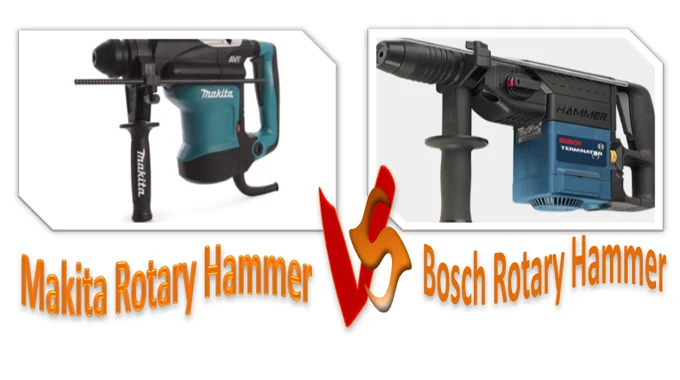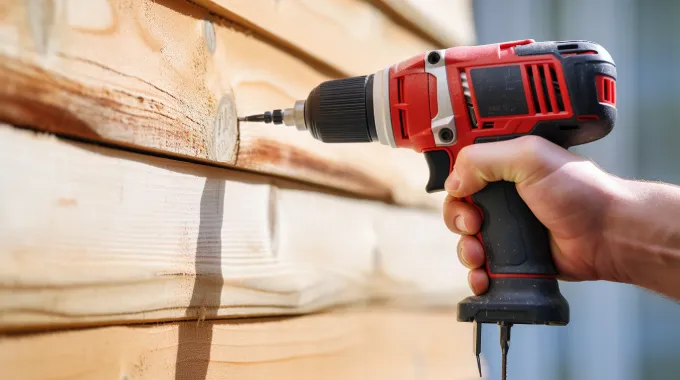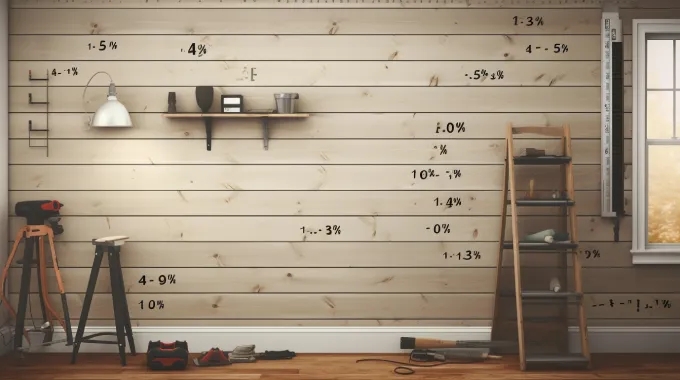Last Updated on September 26, 2022
Rotary hammer drills can be used for several purposes, such as drilling holes for anchors, driving screws, and breaking up concrete. Regarding excellence, two brands stand out from the crowd: Makita vs Bosch rotary hammer.
These two companies manufacture the same tool with high quality that withstand years of intensive use. But, it is pertinent to note that there are key differences between the hammer drills of these two brands.
Rotary hammers use a rapidly spinning hammer to drill through materials. Depending on the application and their brands, these hammers are available in various sizes and styles. See below for a more comprehensive comparison of these power tools.
Differences Between Makita vs Bosch Rotary Hammer
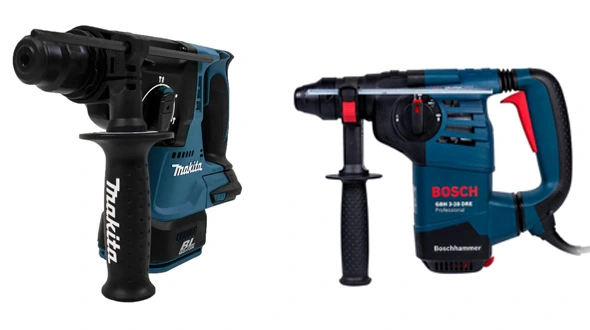
Makita and Bosch rank among the most popular power tool brands. Both companies make rotary hammers of high quality that are built to last. Still, some key differences between the two brands may impact your purchasing decision. The following are some key differences:
Drill Bits
One of the most notable is the type of drill bits they use. Makita’s rotary hammer drill bits are designed for greater versatility, allowing them to be used for a variety of tasks.
Bosch’s SDS plus bits are more specialized, focusing on performance and durability. As a result, Bosch bits are often the better choice for heavy-duty tasks, while Makita’s bits offer more versatility.
Power of Hammer Drill
Both brands offer models with different amounts of power, but Makita has a clear advantage in this area. Their rotary hammers have up to twice as much torque as Bosch models, making them more effective at drilling through tough materials.
Also, Makita’s hammers have longer lifespans and higher maximum speeds, meaning they can handle more complex jobs. If you need a powerful rotary hammer drill, Makita is the better choice.
Compact Design
Makita’s demolition hammer power tool is notable for its compact design. This makes it more maneuverable than the Bosch model, which can be a significant advantage when working in tight spaces. Also, the Makita rotary hammer has a built-in LED light that lights up the workspace, allowing you to see your work better.
The Bosch hammer is not as compact, but it lacks a few features that Makita’s hammer lacks. For instance, Bosch’s model has an integrated dust collection system that helps keep the work area clean.
Hammer Drill Weight
Makita hammer drills tend to be lighter, while Bosch models are typically heavier. This can be a valuable consideration for users who need to perform extended drilling tasks.
Also, Makita’s hammers have ergonomic handles that make them more comfortable to use, even for extended periods. If you choose a heavy drill, you may find it challenging to handle and will fatigue more quickly. Also, weight can affect the amount of power a drill can generate.
Heavier models tend to have more torque, making them better suited to more demanding applications. But, they can also be more challenging to control, so it is wise to choose the right model for the job.
Ease of Use
In terms of user-friendliness, Makita wins hands down. Their hammers are designed with the user in mind, and they come with features that make them easy to use. For example, Makita’s SDS-Plus Rotary demolition hammer features a depth stop that prevents the user from drilling too deep into the material.
Bosch’s hammers don’t have this feature, so users must be more careful when using them. But these hammers have a multi-function selector switch that allows the user to choose between different operating modes: drilling only, hammering only, or hammering with rotation.
Extra Features
Makita’s power tool has an LED light that illuminates the work area, enabling better visibility. Also, many of these drills come with torque-limiting clutch systems with an integrated damper spring that prevents the bit from spinning too fast and damaging the workpiece, which is a handy feature.
Bosch tools include dust collectors, which help maintain a clean work area. They typically come with carrying cases to facilitate easy storage and transportation. A longer electrical cord is also included for better reach.
Bosch & Makita Rotary Hammer – Quick Comparison Chart
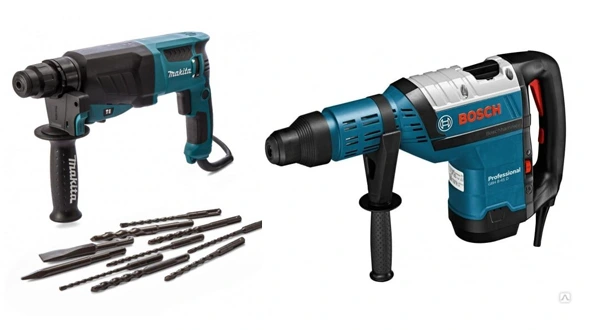
Choosing the right tools is essential for any job, including rotary hammers. Regarding hammers, Makita and Bosch are the leading brands on the market. Here is a quick comparison chart of these two brands to help you choose the right one for your needs:
| Brands | Makita | Bosch |
| Established | 1915 | 1886 |
| Product Lines | Power tools, outdoor power equipment | Power tools, outdoor equipment |
| Bits System | Makita drill bit | SDS plus bits |
| Design | More Compact | Not as compact as Makita |
| Weight | Lighter | Havier |
| Extra Features | Built-in LED light, torque-limiting clutch | Built-in dust collectors, Carrying case |
Makita or Bosch Rotary Hammer : Choosing the Right One
When Choosing a rotary demolition hammer drill, you may be wondering if you should get the Makita or Bosch drill. Both brands provide great features, quality, and durability, but there are some considerations to take into action when choosing one for your needs:
Vibration Control Features
Both power tools pack a punch when it comes to drilling power, but they differ in their approach to vibration reduction.
Makita’s rotary hammers use a “shock-absorbent handle” that is designed to reduce vibration. Bosch’s hammers, meanwhile, feature Active Vibration Control, which uses sensors to detect vibration and then counteract it using counter-rotating masses.
Both systems effectively reduce vibration, but Makita’s anti-vibration technology is arguably more user-friendly since it does not require any special training.
Forward and Reverse Rotation Modes
When choosing between Makita or Bosch Hammer, one of the main considerations is rotation mode. Makita tools offer both forward and reverses rotation modes, while Bosch only offers forward rotation.
Similarly, Makita and Bosch power tools are designed for robust drilling applications. Forward rotation is ideal for drilling through tougher materials, while reverse rotation is better for removing screws and bolts.
Chisel Function
The chisel function of hammers from Makita and Bosch is an essential factor to consider. Both brands offer a variety of chisels, but Makita’s chisels are generally considered to be more durable and effective. Bosch’s chisels are also proficient but tend to wear down more quickly.
In terms of price, Makita’s chisels are typically slightly more expensive than Bosch’s. Despite this, given their superior performance, Makita’s chisels may be worth the extra cost.
Kickback Control
Kickback is a sudden movement of the tool that can occur when the bit becomes stuck in the material being drilled. This can cause serious injury to the operator. You should consider the kickback control when selecting a Makita or Bosch drill.
All the tools offer excellent kickback control, making them two of the safest brands on the market. Also, both companies offer a wide range of models to choose from, so you can find one that best suits your needs.
Variable Speed Control
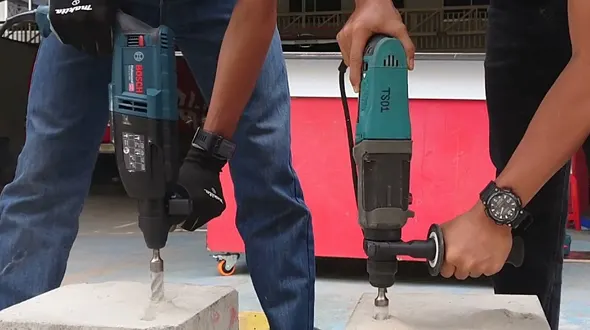
The variable speed control feature allows you to adjust the speed of the drill to match the material that you are drilling. For example, if you are drilling into soft wood, you would want to use a lower speed setting. Conversely, when drilling concrete, you would like to use a higher speed setting.
Makita and Bosch both offer rotary hammers with variable speed control, making it simply a matter of choosing the brand that you prefer. Either way, you can be confident that you will be getting a high-quality product.
Brushless EC Motors
Brushless EC motors are more powerful and efficient than their brush counterparts, making them ideal for heavy-duty applications. Bosch and Makita are two of the most trusted names in power tools, and both manufacture hammer drills with brushless EC motors.
These motors are more efficient and last an extended period than brushed DC motors. They also emit less heat, which helps to prolong the life of the drill bit. On top of that, brushless EC motors provide more torque, suitable for intensive drilling applications.
Hammering Switch
The hammering switch is used to choose drilling or chiseling modes. Bosch models have a locking mechanism that keeps the switch in place, while Makita models have a trigger that must be held down to keep the button engaged.
If you change modes frequently, then the locking mechanism on Bosch models might be more convenient. Although, if you only need to use one mode most of the time, then the trigger on Makita models might be easier to work with.
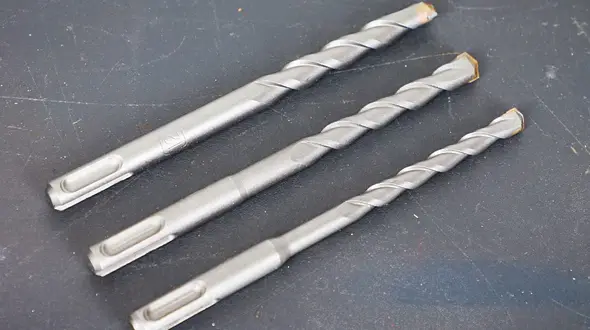
FAQs
Here are some frequently asked questions about Rotary Hammers:
Q: Is a Rotary Hammer Worth It?
Yes, a rotary hammer is definitely worth it when you want to drill through tougher materials or if you need to provide a lot more impact energy.
With a rotary hammer power tool, you can easily switch between drilling and chiseling modes, making it a versatile tool. The rotational force also makes it easier to drill through denser materials like concrete or brick.
Q: Is a Rotary Hammer the Same as a Jackhammer?
A rotary hammer and a jackhammer are not the same tools. A rotary hammer is a power drill that uses a rotating action to create holes in concrete or other hard surfaces. On the other hand, a jackhammer is a handheld tool that relies on direct impact to break up concrete or rock.
Q: Can a Rotary Hammer Break Up Concrete?
Yes, you can break up concrete with a demolition hammer drill. The hammering action of the drill allows it to drill or demolish concrete. Also, many rotary hammers come with chisels or other attachments that are useful for breaking up concrete.
Q: What is an Sds Rotary Hammer?
An SDS rotary hammer is a powerful tool suited to heavy-duty drilling applications. It uses a rotating motion to hammer the drill bit into the drilled material, making it ideal for breaking through thick materials or concrete.
The SDS bits system makes changing bits quick and easy, and the powerful motor ensures that this tool can handle even the most demanding jobs.
Q: What is a Rotary Hammer Drill Good for?
A rotary hammer drill is a perfect tool for drilling through concrete. It has a rotating bit that helps chip away at the material and also features a hammering action that can break things up. This makes it the ideal tool for drilling into concrete, masonry, or other hard materials.
Q: Can Cordless Rotary Hammer Drill Concrete?
Yes, it is possible to use a cordless rotary hammer to drill into concrete. However, it is important to keep in mind that this is a powerful tool and should be used with caution. Also, it is important to read the instructions carefully before using the tool.
Check: Are There Any Reasons Why I Should Store My Sledge Hammer?
Conclusion
Rotating hammer drills are versatile tools that can be utilized in various drilling tasks. Makita and Bosch are both popular brands to consider if you seek a robust and durable rotary hammer.
Makita’s rotary hammers are known for their exceptional power, while Bosch models are appreciated for their low vibration and lightweight design. Both Makita and Bosch offer high-quality rotary hammers that are suitable for most jobs.
Your particular needs and preferences will determine the best tool for you. Hopefully, this article on the “Makita vs Bosch rotary hammer” helped you make an informed decision regarding the best brand to select.
